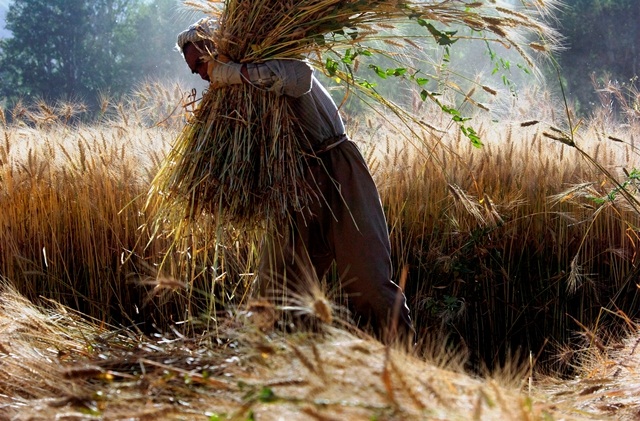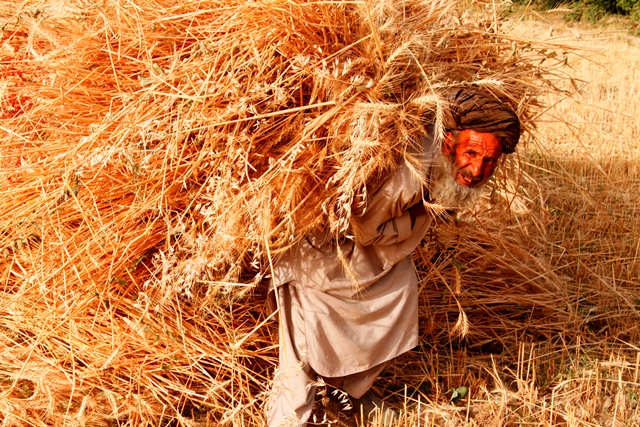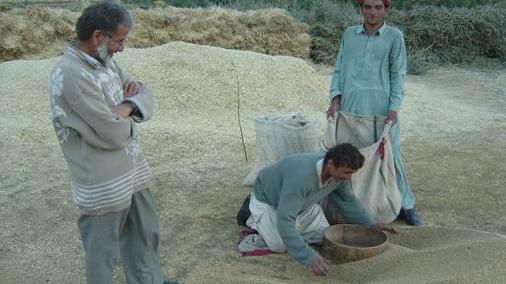KABUL - Farmers in three of Afghanistan’s northern provinces are switching to regular crops such as wheat and onion as major alternatives to opium poppies, the cultivation of which rose to record levels this year, prompting concerns from United Nations officials.“Why should we plant poppies when we have good crop production as a result of sowing improved seeds and using chemical fertilizers,” said a farmer in north-eastern Kunduz Province, Abdul Basir, who received 25 kilograms of certified wheat seeds and 75 kilograms of fertilizer from the Government.
Afghanistan’s Ministry of Agriculture, Irrigation and Livestock (MAIL) and ‘Mission East,’ a Danish non-governmental organization (NGO), distributed improved seeds and chemical fertilizer to over 14,000 farmers in the provinces of Kunduz and Takhar this year.
The UN Food and Agriculture Organization (FAO) has been supporting 33 MAIL-certified seed production companies in Kunduz with processing, stocking and certifying seeds. “Our role is to monitor and advise on processing seeds, and conduct capacity-building training for the companies’ workers,” said an FAO official in Kunduz, Muhammad Jawad Azami.
According to FAO, the distribution of certified seeds and fertilizer to the farmers has boosted licit agricultural yields and is the main reason for the provinces of Kunduz and Takhar remaining poppy-free since 2008. Certified seeds refer to those seeds that have undergone certification procedures which ensure that they are true-to-name and satisfy certain minimum requirements of quality.
“Since the improved seed project was launched in the north-eastern provinces, the harvest has increased to about seven metric tons per hectare of land from about just one metric ton with regular seeds,” said the official responsible for FAO’s improved seeds project in Kunduz, Muhammad Jawad Azami,.
A ‘Mission East’ staff member in Takhar Province, Muhammad Nader Fayez, said the purpose of seed and fertilizer distribution “is to increase the agricultural production.”
Of the country’s 34 provinces, another 13 are also poppy-free, according to a survey launched last week by the Afghan Government and the UN Office on Drugs and Crime (UNODC).
The survey said opium poppy cultivation in Afghanistan rose to record levels this year with a 36 per cent increase compared to last year. UNODC’s Executive Director, Yury Fedotov, described the findings as “sobering,” and warned that the situation poses a threat to the country’s health, stability and development. Afghanistan is the largest producer and cultivator of opium in the world.
Officials in Kunduz’s neighbouring province of Baghlan reported “an unprecedented increase” in onion production this year – a development they described as “a good livelihood alternative to poppies.”
“The farmers used to produce 27,000 metric tons of onions from their 17,000 hectares of land. And this year, the onion production increased to 37,000 MT from the same area of land,” said an official at the Baghlan Department of Agriculture, Irrigation and Livestock, Muhammad Salim.
According to the latest UNODC-Government survey on opium cultivation, Baghlan has only 141 hectares of land under poppy cultivation this year, down from 2,444 hectares in 2004.
A farmer in the Tala-Wa-Barfak district of the province, Noorullah, said profits from 4.2 metric tons of onions grown on his 1,000 square metres of land were much better than the money he earned from growing poppies.
“I earned AFN 100,000 [$1,790] by selling onions – but the opium yield would be only about two kilograms from the same area and it would sell only for AFN 20,000 [$360],” Mr. Noorullah said in a telephone interview.
Although the farmers are happy about agricultural production, they say the lack of cold storage facilities to preserve their crops is a key concern. However, they highlighted that a recent Government announcement on the establishment of such storage facilities in six provinces, including Kunduz, has raised their hopes of this changing.






